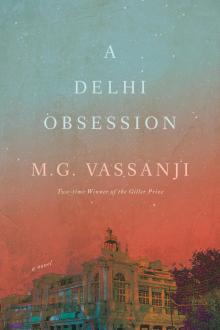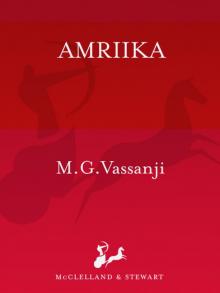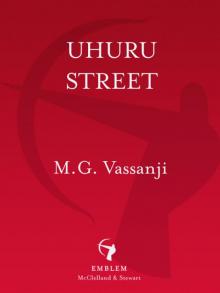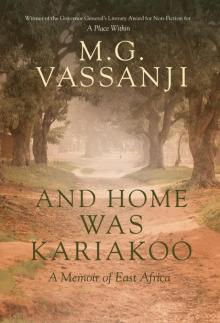- Home
- M G Vassanji
The Book of Secrets Page 7
The Book of Secrets Read online
Page 7
A number of young men in town had their eyes on Anne. He met them at dinner or dances at the new Nairobi Club, all apparently willing to wait on her hand and foot. It was a wonder, as Edwina remarked pointedly to Corbin, that she was not yet engaged. No girl coming in from England survived Mombasa, they all arrived at the capital well after their honeymoons. Only Anne was holding out, but, she gave her guest a smile, not for much longer.
“Would she mind,” he asked Mrs. Unsworth, “a life far away from the city, almost in the middle of nowhere?”
“Anne,” she told him, taking the cue with a grateful look, “is an unusual girl. She is an adventuress. That’s why she is here. If you ask me, she’s bored with society.”
He found Anne intelligent and attractive — perhaps even a little glamorous. Her spontaneous nature complemented nicely his reserve, and it was obvious she preferred his company. But a matrimonial step would have to be thought out carefully. For one thing, his own DC’s approval would be necessary.
During Race Week, Nairobi was covered in a perpetual cloud of dust kicked up by horses, buggies, and motorcars. Many visitors simply set up tents on open ground. At the Turf Club, which was decorated with flags and bunting, people of all tribes gathered to watch the horse races and polo matches. Elsewhere in town there was tennis and cricket, fishing and cockfighting, gambling and boxing. And throughout the week, everywhere it seemed, bands of the police and the King’s African Rifles added a touch of smartness, not to say music, to the whole affair.
He had earlier on called at Government House and signed his name in the official book. He sat for the Swahili and Hindustani language exams, and his interview with the Acting Governor, in the middle of Race Week, went well. Before his departure he and Anne agreed to write to each other.
He took a crowded, festive train back, getting off at Voi, where he spent the rest of the night at the Dak bungalow, sharing rooms with a Swiss farmer and a young South African. The next day, with some askaris given to him by the DC, he marched to Kikono.
When he arrived he was greeted warmly, welcomed back, and it struck him this time, having just come from European society, how much this was home to the Indians and Swahilis, who had resigned themselves to it, a place that was for him only a temporary stop. He could not imagine the future they dreamed of for themselves and their children.
On his first day back he had his midday meal at the mukhi’s, in the shed in the backyard, amidst much peeping from the women and children. But the children of the family he now knew by name, and when he called them they came to him.
The ADCS at Voi had promised to keep an eye open for a good servant. Meanwhile, there was still the plate of chapatti delivered at his doorstep every Thursday, the auspicious eve of Juma.
In a few days Nairobi seemed far away once more, belonging to a world as distant as London or Prague, the world of news reports and memories, from which, however, he soon received the first letters from both Anne and Edwina. How far his domain was from the city he had recently left became apparent in the most shocking manner by the events that followed.
6
8 May, 1914
This instant darkness descends from the heavens. The mbuyu stirs outside, Bwana Tim barks … in this dusk which the Shamsis call maghrab and imbue with mystic significance and dreadful possibilities. A time for prayer, or close to it: twilight, the sandhya. The lamp hanging from the beam above me stirs in the slight breeze I presume is there, disturbing shadows. It is eerie, but for the stern tones and vigorous sounds of the missionaries Miss Elliott and Mrs. Bailey in the kitchen.
Today I had a most distressing confrontation with the maalim — the teacher and exorcist — and because of it, I fear, with much of this town.
This is what happened.
It was close upon 10 o’clock in the morning when I went out for a stroll, as I do by custom, leaving roughly half the day’s petitioners waiting. I would have a chat with the dispenser, Chagpar, against whose prescriptions a complaint had been lodged by an angry father. Having warned the man against carelessness (he responded by saying the father did not know his derrière from his head), I proceeded back, intending to walk around the village. As I passed the Swahili mosque I heard a terrible scream from behind the adjoining house. I stopped in my tracks and, sure enough, there came a sharp, threatening voice, then again a child’s scream (as I thought then) — this time muted — and then another voice, hoarse with protestations … all of which I put down here as best as I can:
“Unaenda?” (Are you going?)
A grunt, a swishing sound as from a whip, a scream, a hoarse cry thinning into a pitiful heart-rending wail.
“Je? Ume nyamaza … unaenda?” (You are silent … are you going?)
“Ndioooo!” (Yes!)
A swish, a wail.
“Mbona yupo!” (Why are you still here?)
A swish.
“Naenda! Naenda baba! Naenda!” (I’m going, I’m going!) the cry trailing off into a whimper.
I don’t know how, but I had left the street and was in the backyard of a house. And it was amazing to see that the cries, the screams, the energetic and clear replies to the shouted questions were all coming from one source: the girl Mariamu. She was seated on a stool, clutching at her hair with both hands, looking at the ground in sheer exhaustion. Her feet were bare, the clothes on her back shredded. She was being beaten. The old maalim, the exorcist, in kanzu and cap, stood over her glowering, a whipping branch in one hand, a tin box in the other. It was his voice that I had heard from outside, putting the questions to the girl. A fog of incense smoke rose from a brazier on the ground in front of the girl and had filled the area. Looking on, stood Rashid, the girl’s stepfather, the mukhi, her uncle, and the girl’s mother (holding an open book, it seemed, for the maalim), all of whom had moved aside when I appeared.
What does our law prescribe for such a situation? Instinctively I cried “Wait!” and the maalim stopped the proceedings and prepared to leave. Firmly, but not without reservation, I took the switch and the tin from the old man. The tin contained red pepper, its contents flew towards my face — I swear not unassisted — and I choked and sneezed. “Don’t play with what you don’t understand,” I heard the old man say.
In a rage, I had the girl removed to my spare room, once used by Thomas. Then I despatched an urgent message to the Mission, and both women later arrived and went straight to my charge. And there the matter stands.
What I witnessed was a crime under the law, and I could not let it pass. And yet I had come upon what was evidently an accepted ceremony, involving respectable members of this town. The maalim’s disrespect and defiant attitude could be the beginning of a rebellion. My authority has suffered. And my reputation, certainly, at the Mission. I have to decide upon a suitable course of action.
A short while ago the girl became hysterical and I heard one of the ladies deliver what sounded like two sharp slaps, at which moment the girl gave a startled yelp, almost of surprise, and then became quiet.
To add to Corbin’s sleeplessness that night, a drum started beating in the dark somewhere: a long, monotonous beating that left him nauseated and sweating, tossing and turning restlessly, waiting for sleep to come. Were they trying to frighten him, calling up spirits to harm him, playing on his jangled nerves? The two mission ladies slept in the spare room with the girl. He had no idea of when he fell asleep, it was after a strong whisky, but he woke up to find himself on the floor beside the bed and Miss Elliott in the room with breakfast. Outside, the sun shone brilliantly, everyday sounds came reassuringly from down the hill, and it seemed that the worst was over.
That morning, the ladies took the girl with them to the Mission, Miss Elliott leading her triumphantly by the hand.
A Shamsi girl in the hands of Christian missionaries was sure to bring the mukhi over, and Jamali came that evening to see Corbin.
“Bwana Corbin,” began the mukhi.
“Yes, mukhi.”
“Sir … our daug
hter … taken away by the missionary lady … most inappropriate.” He was referring, of course, to the “daughter of the community,” his niece.
“I did not see your daughter treated at all well, mukhi.”
“Bwana Corbin. You don’t understand … excuse, please. It was not she but a shetani, a spirit. The shetani had to be driven away …”
“Do you believe in all that stuff … spirits?”
“But of course, bwana. Everyone does.” And he murmured something.
“I beg your pardon, mukhi?”
And the mukhi quoted from the Moslem book in Arabic, then gave a translation: “We created man from clay, and the djinn We created from fire.”
The girl’s condition had been desperate, the mukhi said. She had always had strange ways. Going to the river to wash at dusk, which was the hour when the shetani came out. As a child, climbing the twisted mbuyu — the hand of Satan. The shetani resided in mbuyu trees. Did Mr. Corbin know how many slaves had died under the little mbuyu many years ago during the famine? It was where the caravans had rested. And the captives who were too weak were left to die — meat for the lions and hyenas. That twisted mbuyu tree projected their agony. And it housed their spirits. Some good, some bad. The girl had come under their influence.
When a shetani entered her head, she became a tigress, this quiet girl. She would attack her mother using all sorts of language. Ate like a demoness. Only Rashid the transporter, her stepfather, could speak to her then and calm her down. This had gone on for many months.
“But this time, when Bwana Corbin was in Nairobi …” the mukhi said.
“Yes?” Bwana Corbin waited.
One evening, just after the long prayer had begun, the one with the recitation of the avatars, the incarnations of God, the lamps inside the mosque flickered out. There was deathly silence. The sounds of people, animals, fires crackling outside — all ceased. Then suddenly came a peal of shrill laughter. It stopped. And the prayer continued with the roll-call of the avatars: fish, tortoise, man-lion, Rama.… After prayers they found that every light in the town had either dimmed or gone out. They were frightened but went about their business.
The next evening, again, this time when the roll-call reached man-lion — a scream. They all got up and ran out. Others had already run towards the sound. Lights had dimmed. They came upon the girl in her house. She sat wide-eyed on the floor, indecently, laughing hysterically. Her stepfather went to help her, but she rudely spurned him. It took several people to restrain her. It was then that the maalim was told to take over and proceed with his ministrations.
He had tried all kinds of remedies. Prayers, potions. What Bwana Corbin witnessed had been the last resort, for which the maalim had asked permission, warning against faint-heartedness. And the old man had driven out the invader. “Pray God, he will stay out. The girl is to get married.”
“Such treatment … is illegal,” the ADC told the mukhi hollowly.
They stood in silence.
The missionaries had the girl, he thought. They could try to make a fuss out of the incident.
“Let’s wait. Give the girl some time to recover at the Mission. Then we’ll see — we’ll get her released.”
The mukhi was not quite satisfied but agreed to wait.
“And the drumming in the night,” Corbin said cautiously. “Was there a festival in one of the villages?”
“Yes, sir. Another spirit. You see, sir, the villagers were driving out the devil of fever. Another girl, suffering horribly.”
“And is she doing well now?”
“No doubt.”
Corbin stared long and hard beyond the doorway through which the mukhi had walked out. What had gone on in that village? He would probably never find out. Was it something British law would approve of? Most likely not. He felt frustrated and helpless, uncertain. A dark thought fluttered into his mind, which he could not entertain, articulate — something he felt was too big for him. He let out a sigh and made an ordinary observation: administration’s all right, but how the devil do you deal with another culture’s ghosts?
In the following two weeks, the mukhi came several times to see Corbin, demanding the girl’s release.
“What if she doesn’t want to return?” Corbin asked once.
“You joke, bwana,” said Jamali. “She is our daughter.”
Finally the ADC asked Jamali to take a delegation to the Mission, including the girl’s mother, to see for themselves how Mariamu was doing. And if she would come with them, they were to take her. They should show appreciation, Corbin told him, that the girl was happy, and they should give the two missionaries their assurances that the incident would not be repeated. He himself sent a note to the Mission with his own guarantees for her well-being, adding that she was already engaged to be married.
And so Mariamu was released.
7
The rains, it seemed, were over, and a dry spell was upon them. Outside the ADC’s office the Union Jack on the flagpole would give brief intermittent flutters, ever sensitive to the slightest motion in the surrounding air. Down below, the town of Kikono lay still, deadened by the heat of this afternoon hour.
The tensions following the episode involving Mariamu subsided, and on some pretext Corbin had the police band do a march-past. The children loved it and the people were reminded of the dominant yet generous force in their midst. At a football match the government team had gracefully accepted defeat from the locals, Mr. Corbin’s half-time chat with his sergeant not going unnoticed. There were afternoons of music from the ADC’s new gramophone, which he had brought from Nairobi. An askari would sit under the twisted mbuyu with the machine, alternately playing two records for the listening pleasure of an audience that sat quietly on the ground in front of him. And finally the old exorcist had come to visit him, not exactly to apologize so much as to pay respects, which was really the same thing. The maalim explained to Bwana Corbin the “ways of our ancestors,” when, long before the Europeans came, the people lived peacefully, families were without strife, and elders were given respect. The incident of the exorcism was not mentioned. The coffee-seller approached, clicking his china cups — Corbin assumed that someone had directed him this way — and the ADC graciously accepted the maalim’s hospitality. Finally the old man gathered his kanzu and got up, and, promising Corbin some lessons in Arabic script at a future date, presented him with a beginning reader. The ADC walked him to the door. “And one day I will cure you, too,” the maalim told him with a nod and a sharp look, and strode off, his kanzu waving behind him. Corbin smiled indulgently at his back. He was happy. All was well, a crisis had been averted. This was what administration was all about. He despatched a letter to Anne to that effect.
West of Kikono, beyond the bushes that formed a natural boundary of the town, was a small wood, which he had observed from the hilltop Mission, a dark green stretch running northwards, following a seasonal stream. There were native villages there, in the oasis, but he had never visited them — the villagers came regularly to town, for celebrations and to buy provisions, and brought their hut taxes with them. On more than one occasion he had been tempted to change direction and go towards that silent green presence, so distinctive in this landscape of red dust and thorny scrub. But each time something else, farther, had tempted him away. This day, though, he gave in to his instincts and found himself walking towards the wood. The mysterious drums in the night had beckoned from there, had finally proved irresistible.
He crossed the thorny scrub behind the line of buildings that included the Swahili mosque, and a little later realized that he was walking along a footpath. The grass was taller and greener, the ground was soft and falling gradually, but overhead the sun was merciless on one so foolhardy as to forsake shade at midday. Suddenly the path stopped, and a few yards farther he was inside the forest. He was struck by several sensations at once. The cool shade, the tall, still tree trunks around him, interminable ranks of them stretching in front of him, the silence so
deep he could hear his heart beat, his breath draw. Only when he looked directly above him did this darkness seem to have any limit — birds flying, leaves fluttering, sunlight trickling in, filtered by the foliage.
He walked a few steps, leaves and twigs crackling beneath his feet — wondering if he should turn back, sighting a chameleon, wondering further if he should have brought along a rifle or companions at least — and then he stopped, pricking up his ears to the sound of running water. He walked towards the gurgling, now more distinct and reassuring, almost animate, and arrived at a swift stream, brown water rushing between steep banks. At this juncture, where the trees held back to let the stream through, the sunlight fell vertically and broke into shimmering fragments upon the water surface. There were several ways of crossing. Stones had been placed at shallow points, but to reach these he would have to climb down the bank. A little farther upstream the banks rose and came close together. Here a log had been thrown across, which he covered in three steps. He walked some more through the forest until he came to a clearing where stood a village. It was from here, he guessed, that the drumbeats of a few weeks ago had come down to oppress him.
He was welcomed with shouts of “Jambo!” and “Shikamoo!” and given a stool to sit on and milk to drink. In the common area some women in khanga cloth were at work; two toddlers played on the ground. A herd of goats passed in front of him, in the charge of two almost naked boys with spears and shields. He was brought mangoes and bananas to eat, but declined. He was seated in shade, where a host of mosquitoes descended upon him, so he moved his stool out in the sun. An older man arrived and bowed to him, then sat on the ground close to his feet, asking if he had a cigarette. Some young men arrived, with friendly smiles, and asked what he had come for. Just to see how they were, Corbin replied. He talked with the men in Swahili and was told that there was fever in the village. He asked if there was a mganga, a healer, there who cured sickness. They smiled. He said they should come to his office for medicine. He told himself he should talk to the Mission ladies about quinine and write to Mombasa about supplies. He did not know what he had expected to find here; it seemed so ordinary, like dozens of villages he had seen. And yet the drumbeat in the night.… There were layers of life here clearly inaccessible to him, deliberately hidden from him. Finally he got up to go, realizing he had been away too long. As he turned he saw two of his askaris come to meet him. He was a little annoyed, and not a little relieved.

 What You Are
What You Are A Delhi Obsession
A Delhi Obsession When She Was Queen
When She Was Queen No New Land
No New Land Nostalgia
Nostalgia Mordecai Richler
Mordecai Richler The Book of Secrets
The Book of Secrets Amriika
Amriika Uhuru Street
Uhuru Street And Home Was Kariakoo
And Home Was Kariakoo A Place Within
A Place Within The In-Between World of Vikram Lall
The In-Between World of Vikram Lall The Gunny Sack
The Gunny Sack